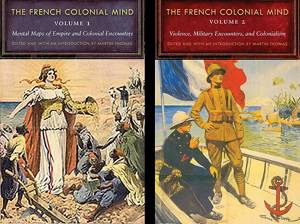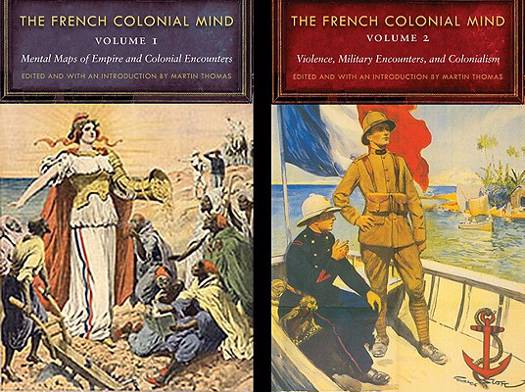
Je cadeautjes zeker op tijd in huis hebben voor de feestdagen? Kom langs in onze winkels en vind het perfecte geschenk!
- Afhalen na 1 uur in een winkel met voorraad
- Gratis thuislevering in België vanaf € 30
- Ruim aanbod met 7 miljoen producten
Je cadeautjes zeker op tijd in huis hebben voor de feestdagen? Kom langs in onze winkels en vind het perfecte geschenk!
- Afhalen na 1 uur in een winkel met voorraad
- Gratis thuislevering in België vanaf € 30
- Ruim aanbod met 7 miljoen producten
Zoeken
The French Colonial Mind, 2-Volume Set
Boek
€ 130,95
+ 261 punten
Omschrijving
Volume 1: What made France into an imperialist nation, ruler of a global empire with millions of dependent subjects overseas? Historians have sought answers to this question in the nation's political situation at home and abroad, its socioeconomic circumstances, and its international ambitions. But all these motivating factors depended on other, less tangible forces, namely, the prevailing attitudes of the day and their influence among those charged with acquiring or administering a colonial empire. The French Colonial Mind explores these mind-sets to illuminate the nature of French imperialism. The first of two linked volumes, this book brings together fifteen leading scholars of French colonial history to investigate the origins and outcomes of imperialist ideas among France's most influential "empire-makers." Considering French colonial experiences in Africa and Southeast Asia, the authors identify the processes that made Frenchmen and women into ardent imperialists. By focusing on attitudes, presumptions, and prejudices, these essays connect the derivation of ideas about empire, colonized peoples, and concepts of civilization with the forms and practices of French imperialism in the nineteenth and twentieth centuries. The contributors to The French Colonial Mind place the formation and the derivation of colonialist thinking at the heart of this history of imperialism.
Volume 2: Violence was prominent in France's conquest of a colonial empire, and the use of force was integral to its control and regulation of colonial territories. What, if anything, made such violence distinctly colonial? And how did its practitioners justify or explain it? These are issues at the heart of The French Colonial Mind: Violence, Military Encounters, and Colonialism. The second of two linked volumes, this book brings together prominent scholars of French colonial history to explore the many ways in which brutality and killing became central to the French experience and management of empire.
Sometimes concealed or denied, at other times highly publicized and even celebrated, French violence was so widespread that it was in some ways constitutive of colonial identity. Yet such violence was also destructive: destabilizing for its practitioners and lethal or otherwise devastating for its victims. The manifestations of violence in the minds and actions of imperialists are investigated here in essays that move from the conquest of Algeria in the 1830s to the disintegration of France's empire after World War II. The authors engage a broad spectrum of topics, ranging from the violence of first colonial encounters to conflicts of decolonization. Each considers not only the forms and extent of colonial violence but also its dire effects on perpetrators and victims. Together, their essays provide the clearest picture yet of the workings of violence in French imperialist thought.
Volume 2: Violence was prominent in France's conquest of a colonial empire, and the use of force was integral to its control and regulation of colonial territories. What, if anything, made such violence distinctly colonial? And how did its practitioners justify or explain it? These are issues at the heart of The French Colonial Mind: Violence, Military Encounters, and Colonialism. The second of two linked volumes, this book brings together prominent scholars of French colonial history to explore the many ways in which brutality and killing became central to the French experience and management of empire.
Sometimes concealed or denied, at other times highly publicized and even celebrated, French violence was so widespread that it was in some ways constitutive of colonial identity. Yet such violence was also destructive: destabilizing for its practitioners and lethal or otherwise devastating for its victims. The manifestations of violence in the minds and actions of imperialists are investigated here in essays that move from the conquest of Algeria in the 1830s to the disintegration of France's empire after World War II. The authors engage a broad spectrum of topics, ranging from the violence of first colonial encounters to conflicts of decolonization. Each considers not only the forms and extent of colonial violence but also its dire effects on perpetrators and victims. Together, their essays provide the clearest picture yet of the workings of violence in French imperialist thought.
Specificaties
Betrokkenen
- Uitgeverij:
Inhoud
- Aantal bladzijden:
- 864
- Taal:
- Engels
- Reeks:
Eigenschappen
- Productcode (EAN):
- 9780803238152
- Verschijningsdatum:
- 1/01/2012
- Uitvoering:
- Boek
- Afmetingen:
- 155 mm x 229 mm
- Gewicht:
- 1297 g

Alleen bij Standaard Boekhandel
+ 261 punten op je klantenkaart van Standaard Boekhandel
Beoordelingen
We publiceren alleen reviews die voldoen aan de voorwaarden voor reviews. Bekijk onze voorwaarden voor reviews.








